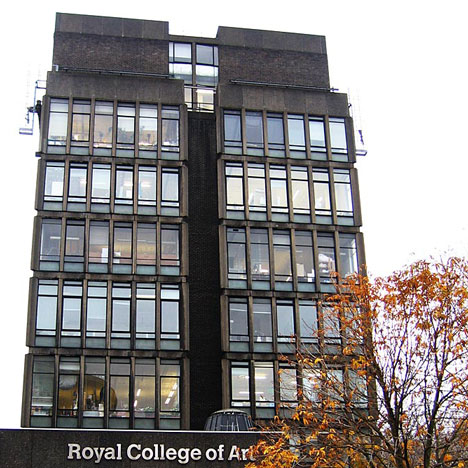
Royal College of Art risks becoming a "Chinese finishing school"
News: the Royal College of Art will end up as a "Chinese finishing school" unless the UK government does more to encourage young people to study art and design, according to writer and broadcaster Andrew Marr.
Marr said the RCA, which this week celebrates its 175th anniversary, was set up by the government to counter the threat of economic decline caused by high-quality goods from overseas markets, but feared politicians today failed to appreciate the importance of design education.
"Design doesn't feature on new models of the core curriculum," Marr writes on the BBC's website. "Art colleges are under the financial cosh. You'd almost get the impression that Westminster [the home of UK government] and Albertopolis [the swathe of South Kensington in London where the Royal College of Art is located] are now different planets."
This Monday, Marr hosted a special edition of Start the Week on BBC Radio 4 to celebrate the RCA's 175th anniversary with guests including former RCA rector and Arts Council chair Sir Christopher Frayling.
In the show, Frayling pointed out that the creative industries provided twice as many UK jobs as financial services, but that this contribution went unnoticed.
"What I never understand is, there are so many column inches about financial services all the time," Frayling told Marr. "Financial services contributes about 1% more than the creative industries, which employ two million people whereas financial services employ one million people. So in terms of contribution to the economy generally, the creative industries actually have it over financial services in almost every way. And how many column inches about it? Very little. So there's this huge impact but people don't seem to be noticing."
In his article, Marr argues that because the economic value of art schools is difficult to measure, politicians fail to appreciate their importance to the economy.
"And there's where I think the trouble lies," Marr concludes. "To invest in art and design means putting public money into areas whose value cannot be captured on a spreadsheet, where concepts like productivity, value-for-money, inputs and outputs - which so reassure the political world - simply collapse. That means faith. It means risk.
"But, without it, hard times surely stretch out rather bleakly. Other countries understand this, including China where more than a thousand art and design colleges are operating and whose students greatly benefit from colleges here too.
"If we don't do more to encourage our young people to art and design, Frayling tells me, the RCA will find itself simply 'a Chinese finishing school'."
During the radio show, Frayling pointed out that the fears over economic decline that led to the foundation of the RCA were similar to contemporary fears. "There was a select committee looking at manufactures and our exports and our balance of payments and they looked at French silk and wallpaper and they looked at industrial design in Prussia and Bavaria and they said what could we do to improve the quality of design for manufacture?" Frayling said.
He added: "And they also said why is there this snobbery about applied arts? Why are we so good at luxury goods and not so good at mass manufactured goods? So they set up the Government School of Design, which is the origin of public sector art education in this country."
Andrew Marr is one of the UK's foremost political writers and broadcasters and is former editor of The Independent.
See all our stories about the Royal College of Art »